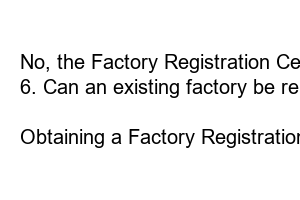공장등록증 발급
Title: Issuance of Factory Registration Certificate: Streamlining Industrial Operations
Introduction:
Setting up a factory is a significant milestone for any entrepreneur. However, before commencing operations, obtaining a Factory Registration Certificate is of utmost importance. This official document ensures compliance with necessary regulations and showcases your commitment to operating your factory conscientiously. In this blog post, we will explore the process of obtaining a Factory Registration Certificate, its significance, and its role in streamlining industrial operations.
1. Understanding Factory Registration Certificate:
A Factory Registration Certificate, also known as an Industrial License, is an official document issued by the regulatory authorities. It indicates that the factory has fulfilled all legal requirements, safety norms, and standards set by the governing bodies. This certificate grants permission to carry out manufacturing, assembling, processing, and packaging activities within the premises.
2. The Application Process:
To obtain a Factory Registration Certificate, entrepreneurs need to submit an application along with the required documents to the designated regulatory department. The application must include details about the factory location, machinery, production processes, safety measures, and environmental impact assessment reports. Providing accurate and comprehensive information is crucial for the successful issuing of this certificate.
3. Mandatory Compliance:
Obtaining a Factory Registration Certificate ensures compliance with various regulatory measures. It highlights the factory’s adherence to safety, hygiene, and environmental norms, protecting the workers and the surrounding community. By actively complying with these standards, a factory can improve its operational efficiency and reputation.
4. Benefits and Significance:
The Factory Registration Certificate serves as proof of legal authorization, assuring stakeholders of adherence to industrial norms. It facilitates access to various government benefits and incentives, including financial assistance, subsidies, and tax rebates. Additionally, this certificate enhances the credibility of the factory in the market, attracting potential clients, investors, and partners.
5. Ensuring Safety and Security:
The Factory Registration Certificate ensures that safety measures are in place to safeguard workers and mitigate potential hazards. It mandates the implementation of fire safety systems, emergency exits, first aid facilities, and periodic safety audits. By prioritizing safety, factories can prevent accidents, reduce downtime, and foster a secure working environment.
6. Regular Renewal and Compliance Checks:
The Factory Registration Certificate is generally valid for a specific period, after which it requires renewal. Regulatory authorities conduct periodic inspections to ensure compliance with prescribed norms. Failure to comply with these regulations may result in penalties or even suspension of the factory’s operations. Hence, maintaining ongoing compliance is critical.
FAQs:
1. What are the essential documents required for obtaining a Factory Registration Certificate?
Applicants need to submit documents such as proof of ownership or lease of the premises, layout plan, machinery details, NOC from local bodies, and an environmental impact assessment report.
2. Does a small-scale industry require a Factory Registration Certificate?
Yes, irrespective of the scale, any factory engaged in manufacturing, processing, or assembling activities must obtain a Factory Registration Certificate.
3. How long does it take to obtain the Factory Registration Certificate?
The timeline for obtaining the certificate may vary depending on the completeness and accuracy of the application and the regulatory authority’s processing time. It is advisable to initiate the process well in advance.
4. What happens if a factory operates without a Factory Registration Certificate?
Operating without a Factory Registration Certificate is illegal and carries severe consequences, including closure, penalties, and legal action.
5. Can the Factory Registration Certificate be transferred to another owner?
No, the Factory Registration Certificate is non-transferable and specific to the owner or entity mentioned in the application.
6. Can an existing factory be relocated without affecting the Factory Registration Certificate?
Relocating a factory requires obtaining permission from the regulatory authorities to ensure compliance with safety norms and the transfer of the Factory Registration Certificate to the new location.
Summary:
Obtaining a Factory Registration Certificate is a pivotal step for any factory owner, ensuring compliance with legal, safety, and environmental norms. This certificate not only validates the factory’s operations but also unlocks numerous benefits such as financial incentives, tax rebates, and enhanced credibility. By prioritizing comprehensive compliance with regulatory measures, factories can ensure safety, security, and sustainable growth in their industrial ventures.

